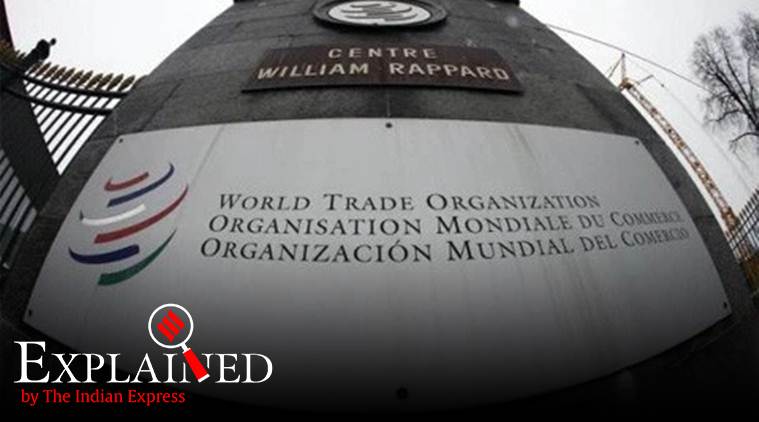Explained: The WTO’s dispute settlements mechanism is all but dead. This is why India should worry
, Edited by Explained Desk | New Delhi | Published: December 9, 2019 6:29:55 pm

India export subsidy, India export subsidy programmes, india export, World Trade Organization
The World Trade Organization’s (WTO’s) dispute settlement mechanism is on the brink of collapsing. Of the three members currently on the seven-member body, the terms of two end on Tuesday (December 10).
The dispute settlement mechanism requires at least three members to function, and world trade is about to enter a phase in which there will be no official resolution for many international disputes — potentially creating the circumstances for a free-for-all.
It could also signal the demise of the 24-year-old WTO itself, some of the darker progonses in the global media on Monday said, given that the system for settling disputes has been the organisation’s most important function.
So what is the problem with the WTO Appellate Body?
Over the last couple of years, the membership of the body has dwindled to (the present) three persons (instead of the required seven) as the United States has blocked the appointments of new members, and the reappointments of members who had completed their four-year tenures.
The US believes the WTO is biased against it, and has criticised it for being “unfair”. The administration of President Donald Trump has, therefore, taken the decision to starve the body of personnel and to disregard its authority — imposing new tariffs on not just China, but also American allies such as Canada, Europe, and Japan.
Trump sees the WTO — which seeks to ensure equal treatment for all its members — as standing in the way of “America First”, tying its hands when it tries to protect American workers or seeks to effectively employ the advantages of being the world’s most powerful economy.
Trump supporters believe the WTO has encouraged China — helping it to strengthen its economy at the cost of other nations including the US, while doing nothing about the unfair trade practices that it uses widely.
How has the shortage of members impacted the working of the Appellate Body?
The understaffed appeals body has been unable to stick to its 2-3 month deadline for appeals filed in the last few years, and the backlog of cases has prevented it from initiating proceedings in appeals that have been filed in the last year.
The three members have been proceeding on all appeals filed since October 1, 2018. India has been impacted directly as a result of this situation.
In February 2019, the body said it would be unable to staff an appeal in a dispute between Japan and India over certain safeguard measures that India had imposed on imports of iron and steel products. The panel had found that India had acted “inconsistently” with some WTO agreements, and India had notified the Dispute Settlement Body of its decision to appeal certain issues of law and legal interpretations in December 2018.
Between 1995 and 2014, around 68% of the 201 panel reports adopted were appealed. While the US is directly involved in more disputes than other WTO member countries, several countries — including India — enter disputes as third parties. India has so far been a direct participant in 54 disputes, and has been involved in 158 as a third party.
Over 20 developing countries met in New Delhi in the summer to discuss ways to prevent the WTO’s dispute resolution system from collapsing all together. Their efforts have not produced the desired results.
And what can happen here onward?
The Appellate Body, set up in 1995, is the standing committee that presides over appeals against judgments passed in trade-related disputes brought by WTO members.
With over 500 international disputes brought to the WTO and over 350 rulings issued since 1995, the organisation’s dispute settlement mechanism is one of the most active in the world, and the Appellate Body is the highest authority in these matters.
The WTO’s dispute settlement procedure is seen as being vital to ensuring smooth international trade flows. The Appellate Body has so far issued 152 reports. The reports, once adopted by the WTO’s disputes settlement body, are final and binding on the parties.
There is now great uncertainty over the dispute settlement process. Once the body becomes non-functional, countries may be compelled to implement rulings by the panel even if they feel that gross errors have been committed.
Should such a country refuse to comply with the order of the panel on the ground that it has no avenue for appeal, it will run the risk of facing arbitration proceedings initiated by the other party in the dispute.
This does not bode well for India, which is facing a rising number of dispute cases, especially on agricultural products. In the last few months alone, four cases have been brought to the WTO against India’s alleged support measures for its sugar and sugarcane producers.
For all the latest Explained News, download Indian Express App
© IE Online Media Services Pvt Ltd
0 Comment(s) *
* The moderation of comments is automated and not cleared manually by indianexpress.com.